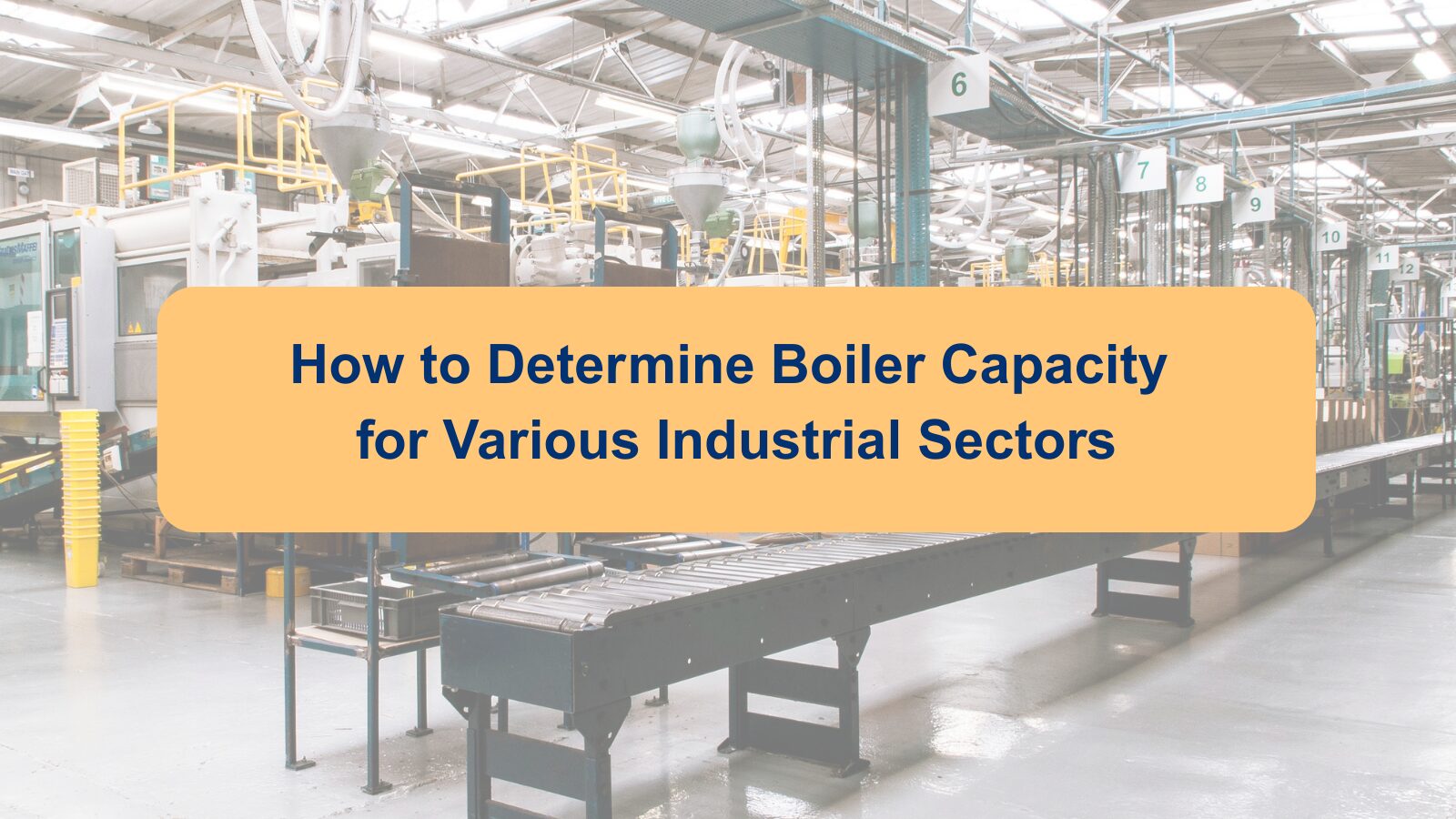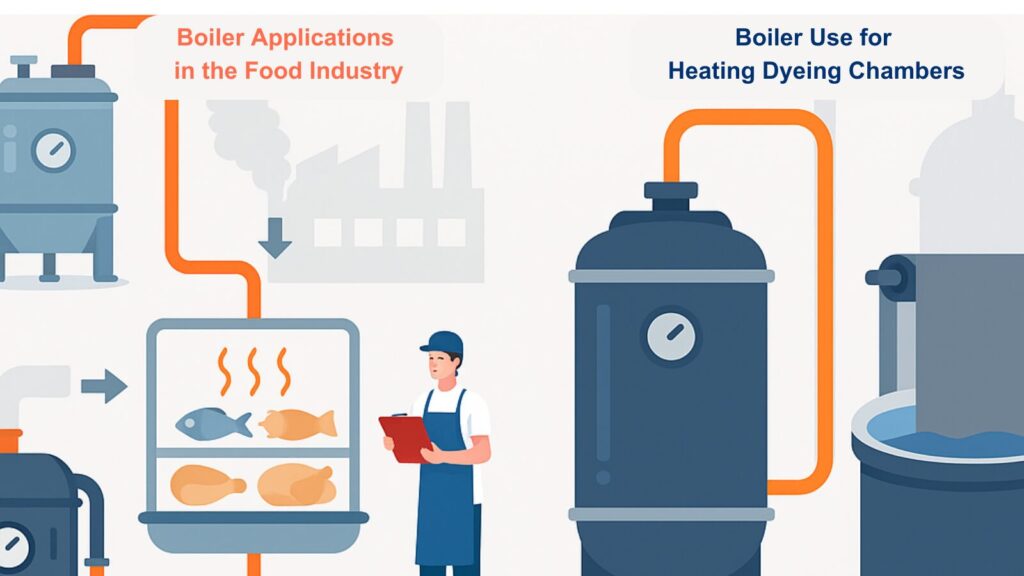1. Why It Is Essential to Accurately Determine the Capacity of Industrial Boilers
Before investing in or upgrading an industrial boiler system, the first and most important step is to accurately determine the required capacity. This is not merely a technical calculation but the foundation for designing an efficient, sustainable, and long-term energy system. An incorrect capacity can disrupt the entire production line: either steam shortages lead to operational shutdowns or excess capacity causes waste and higher investment costs. Therefore, accurately calculating boiler capacity is the “key” to controlling operations, saving energy, and optimizing investments.
1.1. Operational Efficiency and Cost Savings
One of the most evident benefits of determining the correct boiler capacity is optimizing operating costs. If a company selects a boiler that is too large for actual needs, it will result in unnecessary fuel consumption, higher maintenance costs, and wasted initial investment. Conversely, if the capacity is too low, the system will have to operate continuously at high loads, reducing equipment lifespan and increasing the risk of failure. With accurately calculated capacity, the boiler will operate within an optimal range, consume less energy, and yield significant cost savings over time. This is particularly important for medium to large-scale manufacturing businesses, where energy costs account for a significant portion of total operating expenses.
1.2. Improved Efficiency and Ensured Production Processes
Boilers are central to providing heat for many critical stages in production lines. If the capacity is insufficient, steam will not meet demand during peak hours, causing delays and impacting product quality or productivity. Correctly determining capacity helps maintain stable steam pressure and temperature, enabling other equipment to operate efficiently and synchronously. Furthermore, operating within the optimal capacity range reduces vibration, limits sudden shutdowns, and increases reliability across the entire line. This is especially important in industries requiring high stability, such as food processing, textiles, and healthcare, where even a minute of downtime can cause major losses.
2. Key Factors Affecting Boiler Capacity
Calculating industrial boiler capacity must be based on several specific technical factors. Below are two of the most critical:
2.1. Actual Steam Consumption
2.1.1 Definition of Actual Steam Consumption
This is the foundational factor to determine the required boiler capacity. Depending on the industry, each business will have different steam consumption levels. Common applications include:
- Industrial laundry
- Fabric drying, agricultural drying
- Food steaming, distillation
- Sterilization of medical equipment
Basic Calculation Formula:
Steam capacity (kg/h) = Total hourly steam demand × Safety factor (1.1 to 1.2)
Explanation: The 10–20% safety factor ensures stable boiler operation during load fluctuations or sudden demand increases.
2.1.2 Benefits:
- Ensures sufficient steam supply for all production stages
- Reduces risk when load increases
- Optimizes equipment lifespan by operating within a stable capacity range
2.2. Output Pressure and Temperature
In addition to steam flow, industrial boilers must provide steam at the correct pressure and temperature levels. These are key parameters that determine heat transfer efficiency and quality.
2.2.1 Example:
- Steam at 10 bar corresponds to a temperature of approximately 184°C
- Some lines require 5 bar (~151°C) for light drying, while chemical reactions may require 15 bar (~198°C)
Industrial electric boilers and industrial fire-tube boilers now allow flexible pressure and temperature adjustment to meet diverse needs.
2.2.2 Benefits of Using Modern Boilers:
- Precise output temperature control
- Reduced energy consumption thanks to efficient heat transfer
- Enhanced safety with automatic pressure relief valve systems
2.2.3 Note: Incorrect pressure or temperature selection can result in:
- Insufficient heat in the process
- Increased fuel costs due to inefficient heat transfer
- Damage to steam-utilizing equipment
2.3. Boiler Efficiency and Heat Loss
Efficiency is a key factor in optimizing industrial boiler system operations. A high-efficiency boiler will make the most of fuel sources, reduce energy consumption, and lower operating costs.
2.3.1 Common Types of Heat Loss to Consider:
- Exhaust heat loss: due to incomplete combustion or heat released into the environment
- Shell heat loss: due to poor insulation or suboptimal design
- Piping heat loss: from poor pipe insulation, long distances, or leaks
2.3.2 Benefits of Using High-Efficiency Industrial Boilers:
- Significant fuel savings thanks to optimized thermal design
- Lower emissions and more environmentally friendly
- Increased durability and stability for the entire thermal system
Technical Tip: Always choose boilers with an efficiency factor of 85% or higher, and integrate heat recovery devices (economizers) to improve overall efficiency.
3. Boiler Capacity Calculation by Industry
3.1. Food Industry
In the food processing industry—especially seafood—steam is used for steaming, sterilization, and rapid heating. Boiler capacity calculation must closely follow actual output.
Calculation method:
- Determine daily output × amount of steam needed per product unit
- Add heat loss from transfer and piping (5–10%)
- Apply a safety factor of 1.1–1.2 to avoid shortages during peak hours
Example: A seafood factory produces 5 tons/day, each ton needs 200 kg of steam → Total 1000 kg + 10% loss + 1.1 safety factor → Required boiler capacity ~1210 kg/h.
3.2. Textile and Dyeing Industry
Steam is mainly used to heat dye tanks, dry fabric, and stabilize color. Capacity calculation must be based on cycle and batch size.
Calculation method:
- Total dye tank volume × required heat from ambient to desired temperature
- Add heat loss through tanks and pipes
- Multiply by a factor of 1.1–1.2 to ensure sufficient steam at all times
Note: Choose an industrial boiler capable of continuous operation and good heat recovery for energy savings
3.3. Chemical Industry
The chemical industry requires high-pressure, high-temperature steam to trigger or maintain chemical reactions. This places special requirements on the boiler.
Calculation method:
- List all reactions requiring steam → determine required mass and heat
- Calculate total steam demand for the entire process
- Select a boiler with appropriate pressure design (e.g., 12–16 bar), usually a water-tube or fire-tube industrial boiler
Recommendation: Combine with automatic control systems to ensure safety during chemical heating
3.4. Drying, Laundry, and Clean Steam Applications
This sector requires dry, clean, and continuous steam to ensure product quality (e.g., drying crops, fabric, equipment sanitation).
Calculation method:
- Total drying or laundry line capacity × hours of operation/day
- Add loss factor due to environment and piping (~10–15%)
- Choose industrial thermal equipment or electric industrial boilers if clean and eco-friendly steam is required
Note: For frequently changing demands, choose boilers with flexible capacity and real-time load adjustment
4. Standard Boiler Capacity Determination Process
4.1. Collect Operational Data
The first step is to accurately collect data on:
- Steam consumption per hour or day
- Equipment operating time by shift
- Required steam pressure and temperature at usage points
- Number of devices using steam simultaneously
Thorough data collection allows realistic calculation and reduces errors in industrial boiler investment
4.2. Calculate Capacity Using the Formula:
Q = (m × Δh) / (3600 × η)
Where:
- m: required steam flow rate (kg/h)
- Δh: steam enthalpy, depends on pressure (typically 1900–2100 kJ/kg)
- η: boiler efficiency, should be 85–90% for modern boilers
Note: Q will be in kW – can be converted to kcal/h or kg/h depending on the energy management system
4.3. Add Reserve Factor
To prepare for unexpected load increases or performance degradation over time, add a 10–20% reserve factor:
Optimal Capacity = Q × 1.1 or Q × 1.2
This ensures stable system operation, preventing overload or steam supply interruptions
4.4. Choose the Appropriate Boiler Type
Once capacity is determined, the next step is choosing the right equipment:
- Electric industrial boilers: suitable for urban areas, clean steam needs, easy maintenance. Safe, no smoke or dust, quiet operation
- Industrial boilers: suitable for large factories, high capacity, available fuel sources (coal, oil, gas). Lower operating costs
- Industrial thermal equipment: ideal for indirect heating systems, requiring precise temperature control, often paired with heat exchangers and steam accumulators
Advice: Choose certified equipment with overpressure protection and automated control systems
5. Common Boiler Types at Maruse
Maruse Engineering offers a variety of industrial boilers tailored to each business’s practical needs. Each product line is optimized for performance, durability, and safe operation.
5.1. Gas/Oil/Coal-Fired Industrial Boilers
This is the traditional boiler type widely used in large factories:
- High efficiency from 88% to 92% due to sealed combustion chambers and optimized heat exchange.
- Supports low to high pressures (6–16 bar), suitable for many production lines.
- Fuel flexibility: natural gas, DO/FO oil, or coal.
- Ideal for large-scale food processing, textile, and chemical factories.
Key Advantages:
- Low operating costs when utilizing available fuels.
- Durable, easy to maintain, and compatible with heat recovery systems.
5.2. Electric Industrial Boilers
An environmentally friendly solution, aligned with green industry trends:
- Zero CO₂ emissions, no environmental pollution.
- Clean operation, no need for exhaust treatment or fuel storage.
- Compact design, easy to install in urban areas or clean rooms.
- Flexible power and temperature adjustment according to actual load.
Ideal for:
- Medical facilities, laboratories, clean food factories.
- Locations requiring high safety standards and limited installation space.5.3. Integrated Industrial Thermal Equipment
Beyond steam generation, modern thermal devices optimize heat handling across the system:
- Integrates functions such as: heating, sterilization, heat exchange, and steam flow control.
- Minimizes heat loss, enhances overall system efficiency.
- Supports automation, saving labor and energy.
Ideal Solution for:
- Businesses needing stable, long-term efficient systems.
- Sectors requiring strict temperature control such as pharmaceuticals, food, electronics.
6. Benefits of Accurate Capacity Determination
Accurately determining boiler capacity brings many practical benefits, not only financial but also in stability and production efficiency:
- Optimized investment costs: Avoid buying oversized equipment or steam shortages disrupting production.
- Extended equipment lifespan: Operating at design capacity reduces breakdowns, lowers maintenance costs, and prolongs usage time.
- Efficient and stable operation: Provides sufficient steam as needed, maintains stable production, avoids overload or energy waste.
- Fuel savings: Optimized performance controls fuel use, reducing long-term operating costs.
- System safety: A properly sized system reduces the risk of explosions or damage from overload.
7. Frequently Asked Questions (FAQ)
7.1. Can the capacity be expanded later?
Yes. Maruse provides modular boiler solutions that allow easy capacity expansion as needed.
7.2. Are electric industrial boilers safe?
Absolutely. When designed to standards and equipped with overpressure and overheating protection, they are completely safe.
7.3. Should I choose a fire-tube boiler or an electric boiler?
It depends on energy source, pressure needs, and investment/maintenance costs. Maruse offers free consultation to help you choose the most suitable type.
8. Conclusion
Accurately determining industrial boiler capacity is the core factor for production optimization. Maruse Engineering offers complete solutions for electric industrial boilers, fire-tube boilers, and industrial thermal equipment for every requirement.
Contact Maruse today for the best boiler solution tailored to your business!


